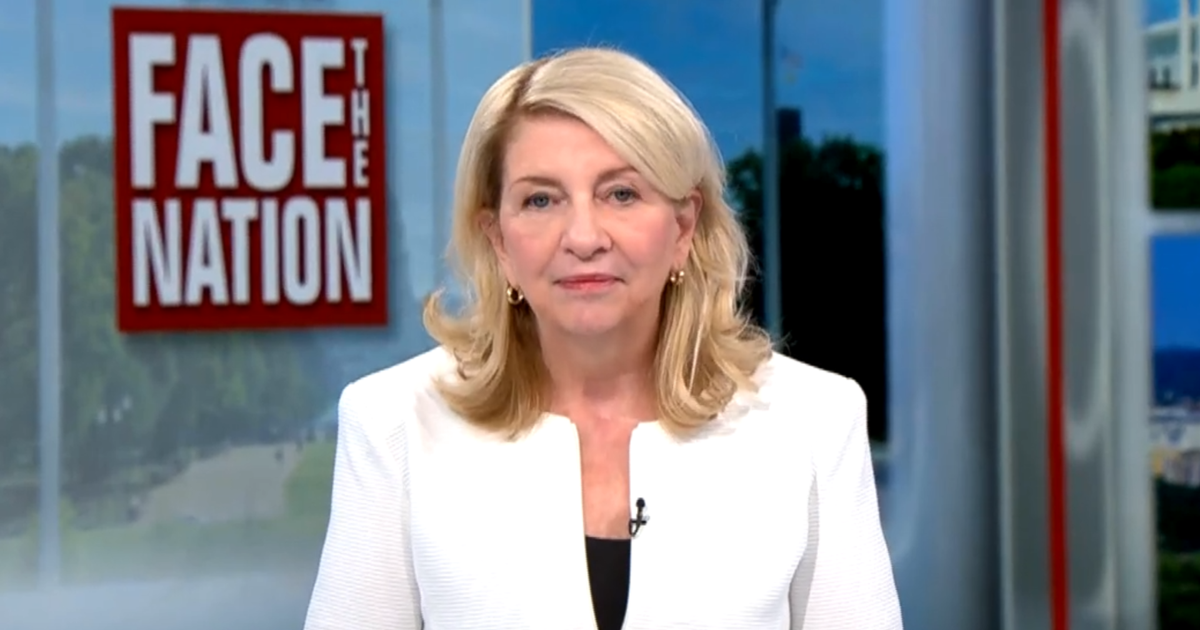The following is a transcript of an interview with UNICEF Executive Director Catherine Russell that aired on April 28, 2024.
MARGARET BRENNAN: We want to take a closer look at the growing humanitarian crisis when it comes to the world's children. Catherine Russell is the Executive Director of UNICEF and has just returned from Israel and the West Bank. It's good to have you here.
CATHERINE RUSSELL: Thank you Margaret, nice to be here.
MARGARET BRENNAN: I know you've met with some of the families of Israeli children who are still being held hostage. There's a one-year-old, there's a four-year-old. And you've met with Israeli officials about aid access to Gaza. Have you received any good responses?
CATHERINE RUSSELL: Well, we got some good responses, which is I think a growing awareness of how important it was for us to get more help and specifically that we needed more access points, better security. You know. I am surely not the only person who made these arguments and argued with the government of Israel. But we have seen some improvement in Gaza. So that's a positive that came out of it. Obviously, the needs still far, far exceed what we're capable of, but at least we've seen some progress.
MARGARET BRENNAN: You also went to the Palestinian West Bank and 2023 was the deadliest year for children in the West Bank since they started tracking at the UN in 2005. With all the attention on Gaza, tell me what the it's happening to children in the West Bank. Bank right now.
CATHERINE RUSSELL: Well, it's — you know, the first day I met with, as you said, the families of the hostages. Day two: I was in the West Bank and I heard them talking about, excuse me, the challenges that children face every day just trying to go to school, the barriers they face, the difficulty in getting around the points of control, everything else. of this–
MARGARET BRENNAN: — Israeli checkpoints?
CATHERINE RUSSELL: And as you said, yes, and as you said, there is an increase in violence. And I think this year alone there have been 40 children — Palestinian children killed, two Israeli children killed. There's just an increase in violence, and as always, the kids are really affected by it. You also mentioned, you know, that I met with the families of the hostages. I mean, they're devastated by what's going on. Some children are still in detention, others are traumatized, either from being detained themselves, or from seeing family members killed and injured. And I, I think I would say that in general I came back with the feeling that there is so much pain and misery everywhere you look. And it's really sad to see and just pray for a better and better day for everyone in the situation.
MARGARET BRENNAN: The UN says that every 10 minutes a child is killed or injured in Gaza. I mean, that just hits you in the chest when you hear that.
CATHERINE RUSSELL: It's a shocking number.
MARGARET BRENNAN: It's horrible.
CATHERINE RUSSELL: That's what's happening.
MARGARET BRENNAN: And the US this week called for an investigation into this mass grave that was just found in Gaza, of hundreds of people. Were there children? what do you know
CATHERINE RUSSELL: You know they don't… UNICEF doesn't know much about it, honestly. I think I would say a couple of things. First, a full investigation of what happened must be done. And I think that, at some point, I'm sure, I hope, it will happen. And second, for me, it argues, again, the importance of having an international press in Gaza. Yo-yo- I say it over and over again because you have disputes about what really happened, what is going on. And I don't think, you know, look, there are incredibly brave Palestinian journalists and press people who are doing incredible work. Many of them have suffered so much, people have died. I think having the international press is also very important. And I hope that this will, that will change soon and people in the international press will be able to come in, really make their own assessments of what's going on.
MARGARET BRENNAN: And if the Israeli government allows it, I think a lot of news organizations would absolutely go for it.
(CROSSTALK)
CATHERINE RUSSELL: – they absolutely should be there, they should be watching what's going on.
MARGARET BRENNAN: The US military, as you know, is setting up this port which is supposed to be open sometime in May. We recently had the head of Doctors Without Borders. And he told me that there is “a slow-motion massacre” of people suffering deprivation of food and water for six months. “You can't drop lentils from the sky,” she said. You need a massive medical response. Is there any plan to do this to revive some of these starving children? And will it come before there is an invasion of Rafah?
CATHERINE RUSSELL: Well, let me say a couple of things. One, the humanitarian situation, especially for children, is incredibly worrying everywhere. We know in the north, where it has been very difficult for the humanitarians to get in with food. And as you say, children in particular need what we call therapeutic feeding, right? Therefore, they need reinforcement or some kind of interventions by medical professionals. So it's not, as you say, just dropping food. It's not enough. We need to do more for young children. It's definitely nowhere near where it needs to be. I think you know, the idea of the port, the idea of the air drops, you know, look we're supporting is getting a lot, getting as much help as we can. But the truth is that the most important thing is to enter more and more by road access. This is the best access. It is the most secure access. It's the best for humanitarians, and it's the easiest way for us to get around. That being said, it is very difficult to do so for so many reasons, not least of which is that the roads are all broken. right? We have security issues. So it's challenging, it's kind of challenging problems. And I think we need a number of ways to try to respond to that.
MARGARET BRENNAN: Please tell me what's happening in Sudan, which is the biggest displacement crisis in the world for children right now.
CATHERINE RUSSELL: Sudan is terrible for children. It is, as you say, the greatest displacement, millions of children are on the move. There are hardly any children at school. I think 90% of children don't go to school. There is incredible violence, including sexual violence, that children suffer and witness. Children suffer from malnutrition. It's an absolutely devastating situation, and we all need to pay more attention to it, for sure.
MARGARET BRENNAN: And these are the next generations we're talking about.
CATHERINE RUSSELL: You know what, Margaret, that's the thing about working with children. right? It's like, on the one hand, they're so vulnerable to everything that happens to them and you know, you mentioned Rafah, I mean, if – if there's a raid on Rafah, it's unimaginable to imagine how – what the violence will be like. and how they will suffer. But whether it's in Gaza, or Sudan, or Haiti or so many other places, children are suffering a lot, and we all talk about children being the future. Well, okay, then we have to protect them. We must ensure that they are educated and healthy, and that they have a decent future ahead of them. And this is fundamental for them. And it's critical for their countries, and it's critical for all of humanity.
MARGARET BRENNAN: Catherine Russell, thank you for your insights today. We'll be right back.




